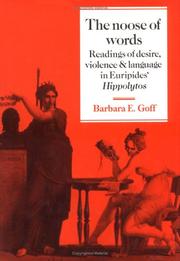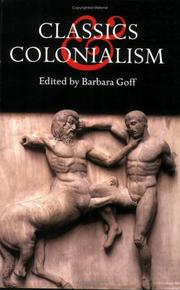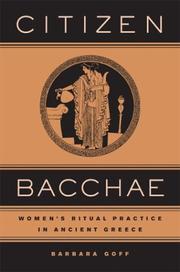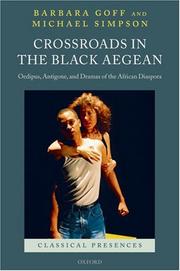| Listing 1 - 9 of 9 |
Sort by
|

ISBN: 0521363977 0521033233 0511627319 Year: 1990 Publisher: Cambridge : Cambridge university press,
Abstract | Keywords | Export | Availability | Bookmark
 Loading...
Loading...Choose an application
- Reference Manager
- EndNote
- RefWorks (Direct export to RefWorks)
This 1990 book is a reading of Euripides' Hippolytos, a central play for the study of Euripides and of Greek tragedy. Dr Goff approaches the play through the techniques of modern literary criticism, including deconstruction and feminism, and is able to shed light on this influential text through her close examination of the language of the play. She divides her discussion into five important critical issues: gender, desire, violence, language and the status of poetry and drama. Throughout she is concerned to site the play in the historical and cultural context of fifth-century Athens, and her analysis of the position of women is particularly illuminating for the role of Phaedra, and for female characters throughout Greek tragedy. This is a provocative book which brings critical insights to one of the most extensively discussed of all Greek tragedies. It will be accessible both to classicists and students of drama and literary theory.
Euripides. --- Desire in literature. --- Hippolytus (Greek mythology) in literature. --- Phaedra (Greek mythology) in literature. --- Tragedy. --- Violence in literature. --- Arts and Humanities --- History --- Hippolytus --- In literature. --- Drama --- Hipòlit --- Hipolitas --- Hipólito --- Hippolütosz --- Hippolyte --- Hippolytos --- Ippolito --- Ippolitu --- 威耳比俄斯 --- Іпполіт --- Хиполит --- Ипполит --- ヒッポリュトス --- هيبوليتوس --- Ἱππόλυτος

ISBN: 0715633112 Year: 2005 Publisher: London : Duckworth,
Abstract | Keywords | Export | Availability | Bookmark
 Loading...
Loading...Choose an application
- Reference Manager
- EndNote
- RefWorks (Direct export to RefWorks)
Classical literature --- English literature --- Imperialism in literature. --- Littérature ancienne --- Littérature anglaise --- Impérialisme dans la littérature --- History and criticism. --- Classical influences. --- Histoire et critique --- Influence ancienne --- Great Britain --- Grande-Bretagne --- Civilization --- Greek influences. --- Roman influences. --- Civilisation --- Influence grecque --- Influence romaine --- Littérature ancienne --- Littérature anglaise --- Impérialisme dans la littérature --- Imperialism in literature --- Civilization, Classical --- History and criticism --- Classical influences --- Rome --- Greece
Book
ISBN: 071563545X 9780715635452 1472521218 147253980X Year: 2009 Publisher: London : Duckworth,
Abstract | Keywords | Export | Availability | Bookmark
 Loading...
Loading...Choose an application
- Reference Manager
- EndNote
- RefWorks (Direct export to RefWorks)
"Set at the end of the Trojan war, Euripides' Trojan Women depicts the women of Troy as they wait to be taken into slavery. While choral songs recall the death-throes of the great city, the scenes between the old queen, Hekabe, and the women of her family explore the consequences of the defeat, from the rape of Cassandra, through the triumphant self-exculpation of Helen, to the pitiful death of Astyanax, thrown from the walls of his ravaged city. Barbara Goff sets the play in its historical, dramatic and literary contexts, providing a scene-by-scene analysis which brings out the pace and intellectual vigour of the play. The main themes are fully discussed, and the book also introduces readers to the issues that have divided critics, such as the extent to which the play responds to the historical events of the Peloponnesian War. The final chapter, which deals with reception, offers new insights into several modern works."--BOOK JACKET.

ISBN: 0520239989 0520930584 1282357271 9786612357275 1597345407 9780520239982 9780520930582 1417545135 9781417545131 6612357274 9781282357273 9781597345408 Year: 2004 Volume: *6 Publisher: Berkeley University of California Press
Abstract | Keywords | Export | Availability | Bookmark
 Loading...
Loading...Choose an application
- Reference Manager
- EndNote
- RefWorks (Direct export to RefWorks)
What activities did the women of ancient Greece perform in the sphere of ritual, and what were the meanings of such activities for them and their culture? By offering answers to these questions, this study aims to recover and reconstruct an important dimension of the lived experience of ancient Greek women. A comprehensive and sophisticated investigation of the ritual roles of women in ancient Greece, it draws on a wide range of evidence from across the Greek world, including literary and historical texts, inscriptions, and vase-paintings, to assemble a portrait of women as religious and cultural agents, despite the ideals of seclusion within the home and exclusion from public arenas that we know restricted their lives. As she builds a picture of the extent and diversity of women's ritual activity, Barbara Goff shows that they were entrusted with some of the most important processes by which the community guaranteed its welfare. She examines the ways in which women's ritual activity addressed issues of sexuality and civic participation, showing that ritual could offer women genuinely alternative roles and identities even while it worked to produce wives and mothers who functioned well in this male-dominated society. Moving to more speculative analysis, she discusses the possibility of a women's subculture focused on ritual and investigates the significance of ritual in women's poetry and vase-paintings that depict women. She also includes a substantial exploration of the representation of women as ritual agents in fifth-century Athenian drama.
Greek literature --- Rites and ceremonies in literature --- Religion and literature --- Women --- Women and literature --- Rites and ceremonies --- Religion in literature --- Women in literature --- History and criticism --- Religious life --- Femme (Théologie chrétienne) dans la littérature --- Femmes dans la littérature --- Femmes dans la poésie --- Femmes dans le théâtre --- Godsdienst in de literatuur --- Religion dans la littérature --- Rites et cérémonies dans la littérature --- Ritussen en ceremoniën in de literatuur --- Vrouw (Christelijke theologie) in de literatuur --- Vrouwen in de literatuur --- Vrouwen in de poëzie --- Vrouwen in het toneel --- Woman (Christian theology) in literature --- Women in drama --- Women in poetry --- Human females --- Wimmin --- Woman --- Womon --- Womyn --- Females --- Human beings --- Femininity --- Religion in drama --- Religion in poetry --- Literature --- Literature and religion --- Moral and religious aspects --- Greece --- Rites and ceremonies in literature. --- Religion in literature. --- Women in literature. --- History and criticism. --- Greek literature - History and criticism --- Religion and literature - Greece --- Women - Religious life - Greece --- Women and literature - Greece --- Rites and ceremonies - Greece --- Women - Greece --- ancient greece. --- ancient history. --- antiquities. --- archaeology. --- athens. --- classicism. --- community. --- domesticity. --- drama. --- female sexuality. --- feminist theory. --- folkore. --- gender roles. --- gender studies. --- gender. --- greek art. --- greek drama. --- greek literature. --- greek women. --- greek world. --- hellenism. --- literary criticism. --- mythology. --- nonfiction. --- patriarchy. --- religion. --- rite. --- ritual. --- sacred. --- seclusion. --- sexuality. --- theater. --- theatre. --- theology. --- tradition. --- vase painting. --- women and religion. --- women. --- womens poetry. --- womens studies.
Book
ISBN: 9780292728653 Year: 1995 Publisher: Austin : University of Texas Press,
Abstract | Keywords | Export | Availability | Bookmark
 Loading...
Loading...Choose an application
- Reference Manager
- EndNote
- RefWorks (Direct export to RefWorks)
Classical Greek literature --- Drama --- Athens --- Historical drama, Greek --- Greek drama (Tragedy) --- Literature and history --- Mythology, Greek, in literature. --- History and criticism --- Theory, etc. --- History and criticism. --- Athens (Greece) --- Intellectual life. --- In literature. --- Civilization.
Book
Year: 1990 Publisher: Cambridge Cambridge University press
Abstract | Keywords | Export | Availability | Bookmark
 Loading...
Loading...Choose an application
- Reference Manager
- EndNote
- RefWorks (Direct export to RefWorks)

ISBN: 9780521033237 9780511627316 9780521363976 Year: 1990 Publisher: Cambridge Cambridge University Press
Abstract | Keywords | Export | Availability | Bookmark
 Loading...
Loading...Choose an application
- Reference Manager
- EndNote
- RefWorks (Direct export to RefWorks)

ISBN: 9780199217182 Year: 2007 Publisher: Oxford Oxford university press
Abstract | Keywords | Export | Availability | Bookmark
 Loading...
Loading...Choose an application
- Reference Manager
- EndNote
- RefWorks (Direct export to RefWorks)
African diaspora in literature. --- African drama (English) --- Classical influences. --- History and criticism. --- African diaspora in literature --- English drama --- African literature (English) --- Classical influences --- History and criticism --- African authors --- Sophocles --- Influence.
Book
ISBN: 9780715639306 Year: 2011 Publisher: London Bristol Classical Press
Abstract | Keywords | Export | Availability | Bookmark
 Loading...
Loading...Choose an application
- Reference Manager
- EndNote
- RefWorks (Direct export to RefWorks)
| Listing 1 - 9 of 9 |
Sort by
|

 Search
Search Feedback
Feedback About UniCat
About UniCat  Help
Help News
News